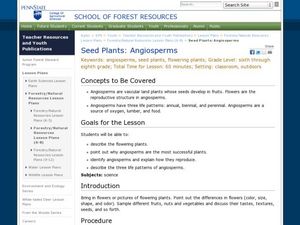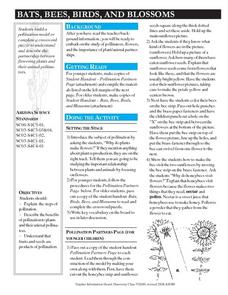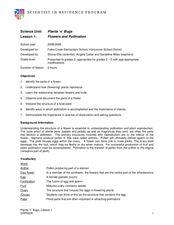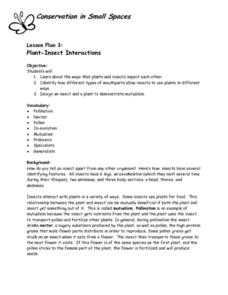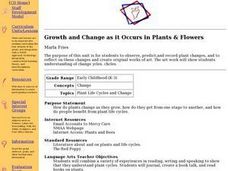Curated OER
Pollination
Fourth graders explore the pollination process. In this plant biology lesson plan, 4th graders dissect a flower to identify the parts of a flower and watch a video to see seed dispersal. Students write about the pollination process.
Curated OER
Plant Life Cycle
Fourth graders explore the plant life cycle. They discuss the sequence of events in the life cycle of the plant and illustrate how the life cycle never ends. Students explore the importance of water, sunlight, and nutrients during the...
Curated OER
Plant Pollination and Fertilization
Fourth graders research and apply knowledge about plant pollination and fertilization in this lesson. They color on a flower diagram the anther, the pistil, the pollen, the pollen tube, the ovary, and the egg to show the process of...
Curated OER
Plants and Animals: Partners in Pollination
Students identify the plant parts and bee structures that are involved in pollination. They simulate pollination in a group activity and process the information.
Curated OER
Seed Plants: Angiosperms
Students describe flowering plants and see why angiosperms are the most successful plants. In this angiosperms lesson students identify angiosperms and explain how they reproduce.
Curated OER
How Do Plant Life Cycles Vary?
In this plant life cycle worksheet, students will complete this graphic organizer by writing in the 3 steps in a plant life cycle.
Curated OER
The Great Pollinators
Students discover the reproductive parts of a plant. In this biology lesson, students identify and categorize several different plants they dissect in class. Students record their information using a data chart.
Curated OER
Bats, Bees, Birds, and Blossoms
Youngsters use a paper bee to pollinate two paper flowers. They use hole-punch dots as pollen. Older learners dissect flowers and name the structures involved in pollination. The handouts mentioned in the lesson plan are not included, so...
Curated OER
Inviting Butterflies to the Schoolyard
Students create a butterfly garden. In this butterfly garden lesson, students plot a garden with plant species that will attract butterflies. Students learn about the specific plants and items that will help butterflies use the garden.
Curated OER
Introduction to Plant Reproduction
Eight objectives pertaining to plant reproduction are stated and addressed in this presentation. Objectives include defining sexual and asexual reproduction, comparing monocots to dicots, explaining flower types, and more. Some of the...
Museum of Science
Egg Carton Nursery
Observe nature in action. Young biologists make plant nurseries from cardboard egg cartons. Once the seeds sprout, they move the flowering plants outside and make observations of bees that pollinate the flowers.
Curated OER
What Are Plant Life Cycles?
In this plant life cycles worksheet, students will write in the main idea of the life cycle of a flowering plant. Then students will write in 3 supporting details.
Curated OER
Plant Reproduction Chapter #4
The only way to employ a plant reproduction presentation void of pictures is to support it with actual sample flowers. Botany beginners learn about plant reproduction through an underdeveloped outline of flower structures, reproductive...
Curated OER
Flowers and Pollination
Young scholars explore the environment by researching plant reproduction. In this pollination lesson, students define botany related vocabulary terms such as disc flower, petal and fertilization. Young scholars dissect a flower with...
Curated OER
Plants 1: Plant Parents
Students review their prior knowledge on plants. In groups, they compare and contrast the difference between reproducing asexually and sexually. Using the internet, they research how some plants can be forced to produce asexually.
Curated OER
Looking at Flowers
Students use their bee sticks to cross-pollinate their Fast Plants and also focus in on the anatomy of flowers. They analyze how the parts of a system go together, and how these parts depend on each other. Finally, students describe...
Curated OER
Life cycles
Students identify and explain the parts of a flower and their role in the life cycle of flowering plants, including pollination, seed dispersal and germination using the Internet. Students will also study and discuss the key points and...
Curated OER
Conservation in Small Spaces: Plant-Insect Interactions
Students explore ways that plants and insects impact each other, identify how different types of mouthparts allow insects to use plants in different ways, and design an insect and a plant to demonstrate mutualism.
Curated OER
Prairie Math
Students work together to build models of prairie plants. Using the model, they estimate the height and then measure them using metric and standard units. They write a fraction to represent their part of the whole set and compare and...
Curated OER
Growth and Change as it Occurs in Plants and Flowers
Students work together to observe plants and flowers through their life cycle. In groups, they make predictions and record changes in a journal. Using this information, they create their own original artwork and discuss the plants life...
Curated OER
Buzzy, Buzzy Bee
Students simulate honeybees pollinating flowers. In this pollination lesson, students role-play the process of pollination over the course of several seasons. Students graph results and share their graphs with the class.
Curated OER
Fish and Flowers
Students read and discuss a research article that explains the unlikely link between increased fish populations and increased plant pollination. They answer reading guide questions to discover this ecological relationship.
K12 Reader
What’s Eating You?
Introduce your class to producers, consumers, and pollinators with a reading passage. Class members read the text and respond to five related questions.
The Science Spot
Flower Basics
Learn about plants and pollination with a worksheet about the parts of a flower. After labeling the anatomy of a flower using a word bank, kids explain the difference between self-pollination and cross-pollination, and unscramble...






